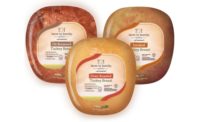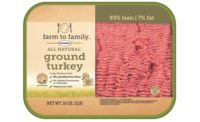Cargill cuts antibiotics usage, launches ABF turkey line

Cargill is again reducing antibiotic use in its turkey business, making good on its promise of ongoing reductions in their overall use. On Aug. 1, 2016, the company ended the use of gentamicin – an antibiotic used in both human and animal healthcare – for disease prevention in turkeys harvested for its two largest brands, Honeysuckle White and Shady Brook Farms. Turkeys will continue to receive antibiotics for control and treatment of disease. Cargill’s turkey products covered by this decision will be available in the marketplace by Jan. 1, 2017.
Correspondingly, Cargill is expanding its antibiotic-free turkey products through the creation of its new Honest Turkey product line. These products will be differentiated from conventional turkey offerings because they come from turkeys that are never treated with antibiotics.
“Eliminating antibiotic use for disease prevention purposes is the next logical step after ending the use of antibiotics for growth promotion purposes, which we began in 2014,” said Jan Hood, head of marketing for the Cargill turkey business. “Based on consumer research and their desire for transparency in food production, we developed the Honest Turkey product line, which communicates the turkeys are raised without antibiotics.”
“To successfully meet the increasing demand from our customers for antibiotic-free turkey, we start with a larger number of birds than required knowing a percentage may become ill, require antibiotics and be removed from our antibiotic-free turkey program,” stated Tim Maupin, head of turkey agriculture operations for Cargill. “We have an obligation to treat turkeys that get sick because we want healthy birds and it’s the right thing to do.”
“As part of our decision-making process, we weighed the desires of our customers and consumers to ensure the long-term effectiveness of antibiotics for people and animals, while also maintaining our commitment to the health of turkeys raised for food,” stated John Niemann, president of Cargill’s Wichita-based turkey business. “When needed, we believe the judicious use of antibiotics in animal agriculture helps assure a safe food supply. At Cargill, we remain committed to exploring fact-based technologies as alternatives to antibiotics, and to the reduced use of shared-class antibiotics when the efficacy of a given technology has been proven effective and economical.”
Underscoring its commitment to reduce antibiotic use for food animals, in March Cargill announced a 20 percent reduction in shared-class antibiotics – those used for human and animal health – used at four beef cattle feed yards owned by the company, as well as five additional feed yards owned by alliance partners that provide Cargill with cattle.
Additionally, the U.S. Food and Drug Administration (FDA) has mandated withdrawal periods for use of antibiotics used for animal health. As a result, the meat consumers eat does not contain antibiotics.
Source: Cargill
Looking for a reprint of this article?
From high-res PDFs to custom plaques, order your copy today!





